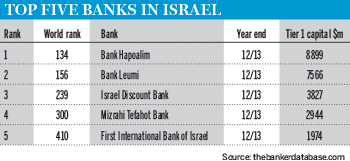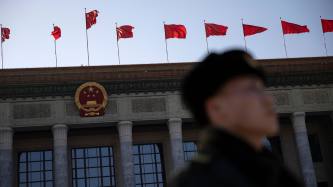The Israeli economy has endured a difficult couple of years. Exports, which account for about 40% of gross domestic product (GDP), have been hit by weak global growth and an appreciation of the shekel. These trends have also impacted inflation, which is currently flat at 0%, well below the Bank of Israel’s target range of between 1% and 3%. Moreover, economic growth for 2014 is expected to be a low 2.3%.
This situation contrasts starkly with the kind of output experienced in the country between 2007 and 2012, when annualised GDP growth ranged between 3.4% and 6.9%, despite taking a big hit in 2009 as a result of the global financial crisis.
In response to the current situation, the Bank of Israel lowered the interest rate over two consecutive months this year to 0.25%. While this has helped to arrest the appreciation of the shekel, the environment has not been conducive to the performance of the country’s banking sector.
“The macroeconomic performance of the country, including the low-inflation, low-interest-rate environment, is impacting the entire banking industry,” says Eldad Fresher, chief executive of Mizrahi Tefahot, Israel’s fourth largest lender by total assets.
On a high
The challenges are clearly significant. Yet, a closer look at the Israeli banking sector's performance over the past 12 months reveals a characteristic resilience that defines much of Israel’s business environment. Many of the country’s largest lenders are in the process of adopting revised strategies, tapping into new domestic markets and optimising their operating efficiency to improve results. Despite the difficulties, most Israeli lenders have their eye on the longer term potential that comes with operating in one of the world’s most globally integrated economies.
For Israel's two largest lenders, Bank Hapoalim and Bank Leumi, the country's hi-tech sector is particularly promising. In recent years, the growth of tech-focused start-ups has flourished, as supportive government policies and greater domestic and foreign investment have helped to propel the country’s hi-tech industry to new heights. For the banks, this booming market offers a strong growth opportunity.
“Over the past two decades, the hi-tech sector has been the engine of growth for the Israeli economy. As the biggest bank in Israel, we need to structure ourselves to fit the macroeconomic picture of the country,” says Yair Seroussi, chairman of Bank Hapoalim.
In a country with a population of less than 8 million, there are roughly 600 new tech start-ups in Israel each year, according to Yossi Beinart, the new chief executive of the Tel Aviv Stock Exchange. By way of comparison, in 2013, Europe had about 400 tech start-ups, while Japan had 80. Tapping into this booming market will clearly be advantageous for the banks. This is particularly true given the current slowdown in larger corporate lending, as these groups have deleveraged and turned to the capital markets.
Bank Hapoalim has partnered with its investment banking subsidiary, Poalim Capital Markets, to invest NIS80m ($23m) over a three- to five-year period in Israeli financial technology (fintech) companies. In October 2013, the bank also partnered with the Microsoft Ventures Accelerator to open a programme tailored to fintech companies by providing financial and technological assistance to new start-ups selected to participate in the programme.
Tech treasures
In recent years, Bank Leumi has adopted an even more proactive approach in the hi-tech space. “Earlier this year we founded Leumi-Tech, a fully owned subsidiary that provides complete financial services to the unique needs of the Israeli hi-tech industry. Its main purpose is to leverage our capabilities in credit risk management and to make the Leumi Group the financial home of the hi-tech sector,” says David Brodet, chairman of Bank Leumi.
In total, $500m of credit financing will be made available to Israel’s hi-tech sector through Leumi-Tech. In addition, the bank has partnered with Elevator, a privately owned business accelerator, to create a fintech innovation hub. Companies involved in the hub receive $20,000 of initial funding and are offered a high level of business and technological support.
The banks are not alone in pursing the country’s hi-tech potential. Mr Beinart of the Tel Aviv Stock Exchange is hoping to position the bourse as a global centre of expertise in this space.
“We want to encourage a greater level of initial public offerings from SMEs [small and medium-sized enterprises] in Israel and to do this we have to position ourselves as the stock market of choice. We need to follow the Australian and Canadian example by becoming a specialised exchange. In our case, the [specialism] would be hi-tech. If we can offer unique services we will be able to attract a greater number of both domestic and, eventually, international listings,” says Mr Beinart.
Investments in the country’s hi-tech and, more specifically, fintech industries have obvious benefits. By supporting and partnering with these companies at an early stage, both the banks and capital markets stand to benefit from the new technologies being developed. This will have implications in terms of improvements to operational efficiency, service offerings, as well as cyber security. Moreover, the scale of the financing opportunity is substantial. At present, the Israeli hi-tech sector is heavily reliant on non-local funding which is mostly sourced through venture capital funds.
The results of this strategy are bearing fruit. Both Bank Leumi and Bank Hapoalim have posted encouraging numbers from the first half of this year, particularly in terms of lending to the middle-market business and SMEs. Bank Hapoalim’s credit to small businesses totalled NIS27.4bn in the second quarter of 2014, an increase of 4.4% from the end of 2013. Meanwhile, Bank Leumi’s credit to small business grew by 3.4% in the first half of this year, while credit to mid-sized companies grew by 5.9%.
More traditional route
In contrast to this approach, Mizrahi Tefahot Bank, which has the country’s third highest return on assets, has prioritised Israel’s retail market. “To date, our entire strategy has been focused on positioning Mizrahi Tefahot as the only truly retail bank in Israel. This means that at least 60% of our balance sheet, revenues and profitability will be driven by households,” says Mr Fresher.
Mizrahi Tefahot’s market share of mortgages now stands at 35%, according to Mr Fresher, up from 27% in 2004. The bank’s first-half figures from this year were particularly impressive. Net profit grew by 7.8% while return on equity was 11.5%.
Moreover, the low-interest-rate environment is spurring a wave of mortgage refinancing. According to figures from the Bank of Israel, a total of NIS11bn was refinanced from the year starting June 2013. This trend appeared to be accelerating in July 2014, as a total of NIS1.08bn in refinanced mortgages was registered. As most refinancing activity is conducted through the original issuer, this appears to bode well for Mizrahi Tefahot. Moreover, Bank of Israel data also indicates there was NIS4.99bn in new mortgages in July this year.
“Unlike the UK or US, mortgage banking in Israel is not all about pricing. It’s not a plain vanilla product. A typical Israeli household will take one mortgage comprised of at least four to six different products, including CPI [consumer price index] fixed, CPI floater, nominal fixed, nominal floater, dollar linked and euro linked, among others,” says Mr Fresher.
“What it means is that we need to have an intelligent dialogue with the client. If you execute this successfully the client is ready to speak to you about their entire relationship with the banking industry, and this can be used to attract new customers across different service lines.”
Efficiency drive
Nevertheless, the difficult operating environment has forced most lenders to pursue greater efficiency. In many cases, this has created leaner banks with some reductions to their international operations as well as cuts to the workforce. Last year, Bank Hapoalim reduced its staff numbers in Israel by 600. A similar number is expected to be cut again this year, although the majority of these will be employees destined for early retirement.
Bank Leumi is taking a similar approach. “We are improving our efficiency in terms of our personnel, and we have reduced our staff by about 10% here in Israel, from 10,000 to 9000. You can see the results of this efficiency drive in our 2014 performance to date. This is in conjunction with improvements to our operational efficiency, in terms of our systems and back-office activity,” says Mr Brodet.
Moreover, Bank Leumi has scaled back its less profitable international operations to keep a focus on the domestic market. This included the sale of its private banking subsidiaries in Switzerland and Luxembourg in July this year, to Swiss private banking group Julius Baer. Under the terms of the agreement, the two lenders signed a strategic co-operation accord which will see client referrals between the banks.
Bank Leumi is set to become the first of the Israeli banks to reach a settlement with the US Department of Justice (DoJ), with respect to the group’s Swiss activities as they pertain to US taxpayers. The bank has provisioned NIS950m for the settlement.
“We are the first Israeli bank expected to reach an agreement with the DoJ. We are in the final stretch of concluding the agreement. We consider this issue behind us and can now implement the bank's strategy with greater intensity and focus on our business activities in Israel,” says Mr Brodet.
Both Mizrahi Tefahot and Bank Hapoalim also have Swiss banking divisions, though according to some analysts, it is likely that any potential DoJ sanctions may be lower in these cases as both operations are smaller in size.
Fields of gold
Looking ahead, Israel’s macroeconomic fortunes are set for a substantial change. The discovery of two giant natural gas fields off the country’s coastline, known as Tamar and Leviathan, has generated a wave of optimism. Though proven reserves, to date, amount to 280 billion cubic metres, the real amount is likely to be significantly higher. The discoveries were made in 2010. Commercial production, stemming from the Tamar field, began in March 2013. The Leviathan field, which is still being explored for its full potential, is not expected to go online until 2017.
“Israel has traditionally been a big importer of energy. This gas discovery is not only going to solve all of Israel’s energy needs but will transform the country into an energy exporter,” says Neil Corney, chief executive of Citi Israel.
As the largest international bank in Israel, Citi has been instrumental in advancing the development of the country’s natural gas potential. “We were a big part of the development of Tamar. We provided a significant bridge loan to one of the exploration and production companies involved in the project. Later on, we led the bond issuance, which was executed in May. It was the biggest project bond issuance for an Israeli infrastructure project,” says Mr Corney.
Legal lending limits in the country prevent local lenders, with their smaller balance sheets, lending more than 15% of their equity to one individual company and more than 25% to one group. Moreover, most local lenders lack the necessary expertise to engage with complex exploration and production hydrocarbons projects, meaning Citi continues to play a vital role in the development of the country’s energy potential.
As this new energy picture develops, the implications for the broader economy will be significant. In particular, the prospects for industrial and infrastructure development are high, as cheap and accessible natural gas will drastically reduce the costs of producing tradeable goods inside Israel.
“The natural gas is of major importance because it is only now starting to be fed into the country’s industrial sector. Over the next two years, pipeline infrastructure will be built and connected to the country’s industrial areas. As such, this gas will support the growth in goods exports from Israel,” says Mr Seroussi from Bank Hapoalim.
Resilience reigns
Financing the necessary infrastructure developments to support the distribution of gas in Israel will provide additional growth opportunities for the banks. “Israel has become very advanced at project financing. The country’s banks are involved in financing water projects, desalination plants, roads and power stations, so infrastructure financing is a particular strength of this country,” says Mr Seroussi.
To that end, Bank Hapoalim has established an equity infrastructure fund called NOY, which, to date, has raised NIS900m and is now considered a major equity player in the country’s infrastructure development.
For an economy that is as globally integrated as Israel’s, the recent slowdown in economic performance has not come as a shock. Instead, the country’s banks, in partnership with a resourceful private sector, are gearing up for the next stage of economic development.
Israel’s reputation as the ‘start-up nation’ is well deserved. It will be this spirit of resilience and entrepreneurship that should ensure the economy, and with it the performance of the country’s lenders, return to full strength before long.













